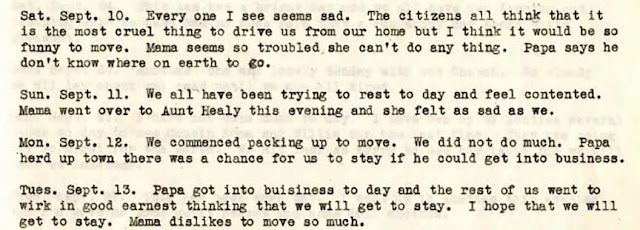Atlanta Garden #10: Walls of Jericho by Jeanne Arnieri
Walls of Jericho reminds us of Atlanta's dark days with her
citizen's expulsion and deliberate destruction by the Union Army.
A Union soldier (are those Sergeant's stripes on his sleeve?) reading
as he guards an Atlanta business in the fall of 1864.
General William T. Sherman stunned Atlanta with weeks of shelling in summer, 1864. Once his army occupied the city more shocks were to come. He issued two daunting orders, first expelling all civilians from the city and then ordering key buildings destroyed.
An exodus in September, 1864
After thinking "much and long," Sherman decided to send Rebel families to the front and "those committed to our cause to the rear." By mid-September 1,600 people departed to Rebel lines and Macon. Citizens and Mayor James Calhoun, of course, objected to the hardships.
Sherman's reply: "You might as well appeal against the thunder-storm as against these terrible hardships of war [begun] in error and perpetuated in pride....Now you must go."
From a 1902 history of the city
Walls of Jericho by Addie
Carrie Berry's diary
"The citizens all think that it is the most cruel thing to drive us from our home but I think it would be so funny to move. Mama [six-months pregnant] seems so troubled she can't do anything."
Carrie Berry's family, the Healeys and the Markhams, went North, but the Berrys remained.
"Papa herd up town there was a chance for us to stay if he could get into business....We will get to stay."
Maxwell's "business" seems to have been clerking for the Union Army in the Quartermaster's Office. Mama didn't want to leave but then again very few Atlantans wanted to leave. What was the Berry's real reason for remaining?
Walls of Jericho (top left) by Brenda
Union troops destroying the city, a Currier print
Sherman's second order remains shocking to this day. He ordered his troops to destroy city buildings with fire and battering rams.
George Barnard's photo captured the reading sergeant near an intersection with buildings that had survived the summer shelling but were soon to be ruined, including the two-story bank on the corner.
Official orders dictated destruction of public buildings like the bank and any that might be useful to the Confederacy after Union troops left. In the chaos many private houses were burned too. The Berrys had a provost guard to watch their house and shield it from the Union torch.
Walls of Jericho by Becky Brown
"We have had a gard a little while after dinner and we feel a little more protected."
[Carrie was not a skilled speller and a year without any schooling could not have helped her
orthography.]
Mary Harris Gay (1829-1918)
Confederate sympathizer Mary Harris Gay (1829-1918) and her mother also stayed in Atlanta
despite expulsion orders, doing laundry and repairing uniforms for Union occupiers. A vociferous Southern apologist, she published her memoir
Life in Dixie During the War in 1892, writing with misplaced pride in her memories of, "
The poor man and the rich man...fighting the same battles in defense of the grandest principle that ever inspired mortal man to combat."
Atlanta Burning from Harper's Monthly
Walls of Jericho by Becky Collis
In summer, 1865, Atlanta was: "Apparently a hopeless wreck...fit habitation only for bats and owls."
John Stainback Wilson,
Atlanta as It Is, 1870
The Block
Walls of Jericho by Denniele Bohannon
BlockBase shows a very skinny center here for #1853.
Our block should follow different proportions and the pattern is revised here
based on our grid of 5x5.
Nancy Cabot (the pen name of 1930s
Chicago Tribune columnist Loretta Leitner) often overdramatized her pattern copy. This is NOT "one of the oldest quilt patterns in existence." In fact I
couldn't find one example made up into a quilt---old or new. But it's a handsome, simple design to remind us of a battle lost.
Above the cutting
instructions for 10" and 15" blocks.
Trout House Hotel and the Masonic Hall 1864
"The entire business portion, excepting the Masonic Hall building and one block of six stores and a hotel was laid in ruins." Sidney Andrews, 1872

.jpg)














.jpg)




2 comments:
I have enjoyed young Carrie's diary entries along with the information you present. Such innocence! And I couldn't help noticing similarities between Sherman's destruction of Atlanta and what's happening this very week in the Mideast.
That's one reason I looked into the Siege of Atlanta. How do people live in such circumstances?
Post a Comment